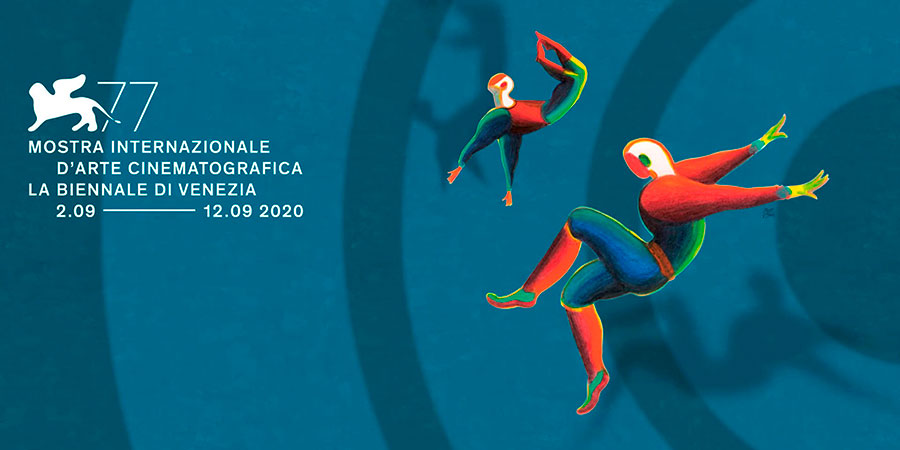
Venice 2020. The fe(a)st after the plague
Publié par Birgit Beumers - 18 septembre 2020
Catégorie(s): Cinéma, Expositions / Festivals
The first major international film festival to hold a live edition (apart from the VR competition, which sensibly went entirely online) was the world’s oldest film festival, the Mostra del Cinema in Venice, this year from 2-12 September.
Of all the major festivals, Venice has always been slightly chaotic, with screenings cancelled, delayed or restarted, with crowds of students waiting for access to screening, and with additions to the competition or changes in the programme in the very last minute, often as the festival was already ongoing. Indeed, that is what always gave Venice that particular flair, that liberal and democratic structure for access to the screenings, that relaxed atmosphere. How would this festival (not the efficiently organised Berlin, not the high-brow and disciplined Cannes, not the small-scale Locarno) be able to handle the measures for Covid-19 imposed by the state and the region of Veneto, one of the seriously affected areas in Italy alongside Lombardy? Surprisingly and amazingly well. As many international publications (Variety, Screen, or Hollywood Reporter) have already commented, the impeccable organisation, from seat booking in chessboard-pattern, a co-ordinated spread of press screenings across different halls to compensate for reduced seating, temperature checks and control of wearing your ‘mascherina’, including staff patrolling the halls during the screenings and spotting (how???) in the pitch-dark room whoever was not wearing the mask over mouth AND nose – this was a remarkable organization involving amazing planning and using online tools to great effect. Chapeau. I think all visitors were extremely impressed with the safety measures, but then there was of course the impressive selection of films in all programmes also, which we should not forget behind the humble gratitude to the organisers for having taken on this major event, live, showing the festival world how to manage live film screenings as opposed to the respectable digital and online format, which will, however, never replace Cinema, with a capital C and on a big screen.
So, as usual, the festival had two competitions: the Venezia 77 competition; and Orrizonti (Horizons), for more experimental films. As a lover of the experimental side, the films that often do not get wide releases, my interest has always been with Horizons, but this year the Giornate degli Autori (Venice Days) and the Settimana della Critica (Critics’ Week) also had their special “bites” to offer. The Giornate were for the programmed by Gaia Furrer, the first woman to head any section in Venice. And that was about time. Furrer continues, of course, the collaboration on “Women’s Tales” with MiuMiu, the short film section where major female directors have films commissioned by the MiuMiu fashion label of Miuccia Prada, using the collection. This year’s screening included Mati Diop’s impressions of the lockdown filmed from her Paris apartment, combined with fragments of recent visits to her grandmother, titled In My Room; and an amazing piece on cross-dressing by Malgorzata Szumowska called Nightwalk.
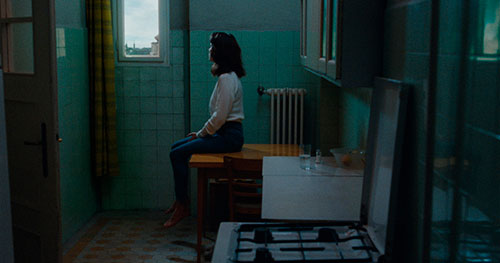
Moreover, the Giornate had several films from Eastern Europe, picking up several titles that missed out following the cancellation of Karlovy Vary with its ‘East of the West’ sidebar and creating some attention for that region, including Russia, which contributed two of the ten chosen films in the section: Whaler Boy (Kitoboy), a debut by Filipp Yuriev; and Ivan Tverdovsky’s Conference (Konferentsiia). Alongside, there was also a Hungarian entry, the very impressive Preparations to be Together for an Unknown Period of Time (Felkészülés meghatározatlan ideig tartó együttlétre) by Lili Horvat, which tells the story of a Hungarian-born neurosurgeon who returns to Budapest after meeting a Hungarian colleague at a US conference and seeing in him the love of her life; however, from his perspective the love story has a different take. It was the Russian debut Whaler Boy which won the section. In his debut film, which comes eight years after graduating from the Moscow Film Institute, Yuriev tells essentially a fairy tale, of a teenage boy growing up. Lyoshka, along with a friend, does all the things that are normal for teenage boys in the modern world, such as riding on a motorbike and looking at girls on the internet. Yet he pursues these adventures in a most isolated and remote village of whale fishers in the far north, in a coastal area near the Bering Strait where Alaska is probably closer than the nearest large human settlement of Anadyr, the capital of the Chukotka. The people here live in a harmony with the tundra that takes them back when they are ready to die, and with the sea and the whales that supply them with food (and income). Yet in order to become a true adult, Lyoshka – like the hero of the fairy tale – also needs to make a journey to another world, through fear and danger, to return and understand where he really belongs: to his people on the Chukotka.
A special event of the Giornate was the new film The New Gospel by the Swiss theatre director Milo Rau, who remade the Gospel with cross references to the current migrant crisis. Rau cites both Pier Paolo Pasolini’s The Gospel According to St. Matthew (1964) and Mel Gibson’s The Passion of the Christ (2004), which both filmed Matera, whilst unravelling the suffering of Christ against today’s migrant camp near Matera, underscoring the relevance of the bible story for the contemporary world, including the readiness for violence against ‘others’ in some members of the local community, now as much as in the days of Pontius Pilate. For the main part Rau invited political activist Yvan Sagnet, who arrived in Italy back in 2007 from Cameroon and has since both studied in Italy and become a leading activist against the caporalato. Thus this version of the gospel challenges local and global politics and unravels the anti-capitalist agenda of the Christ-figure.
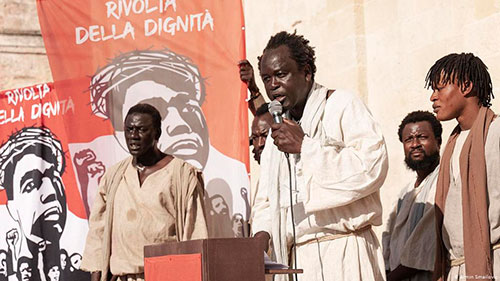
In the Orrizonti section, the most impressive and surprising film was Shakram Mokri’s Careless Crime (Jenayat-e bi deghat), which loosely weaves together two temporal stands: a fire in a cinema at the peak of the Iranian revolution in 1978; and a repeat attack by four arsonists targeting a screening of a film about a stray missile in contemporary Iran. Yet the main award of the section went to Mokri’s fellow-citizen Ahmad Bahrami for his black-and-white film Wasteland (Dashte khamoush), a grim and bleak portrayal of the feudal structures of an outdated working community producing bricks in a remote location in Iran. A third Iranian film played in competition, where the best young actor/actress award went to Rouhollah Zamani in Sun Children (Khorshid) by Majid Majidi, which shows the life of migrants from Afghanistan and homeless children as they attempt to attend school so they can find a treasure, which turns out to be yet another false belief.
In Orrizonti the festival also screened a rare film from Palestine by Tarzan and Arab Nasser, Gaza Mon Amour. As the title suggests, the genre of the film leans more towards light drama and romance than a serious film we may expect from the war-stricken area of Gaza. Yet the comedic elements unfold against a background of social restrictions, military attacks and work limitations in Gaza. It is the story of a 60-year old bachelor fisherman, who decides to propose to a widow about his age, who is ostracized because her daughter lives with her after a divorce, helps her mother with her clothes shop, and attends university. However, the complication in the blossoming relationship of the fisherman and the widow is hampered by another event: when the fisherman pulls out an antique statue of Apollo from the sea, a significant part of the statue breaks off… and he gets caught by the authorities for hiding a treasure of which nobody quite knows the real value.
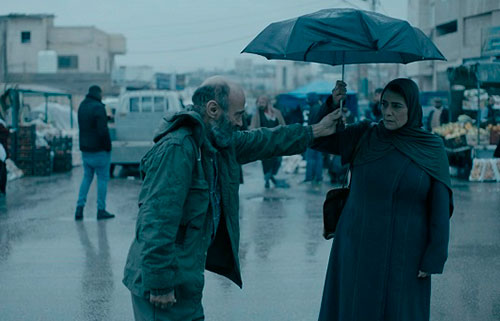
In competition, there were four Italian films among the 18 titles selected, including Gianfranco Rosi’s impressive documentary Notturno, shot over three years in various migrant camps in the Middle East, across Iraq, Kurdistan, Lebanon and Syria. Almost half of the competition films were by women filmmakers, a fact that should probably be stressed in the light of recent criticism that the Venice head of programmers, Alberto Barbera, has faced in the past. Among them were Jasmila Žbanić’s Quo Vadis, Aida?, which tells from the perspective of the UN interpreter Aida the story of the massacre in Srebrenica in July 1995, when the Serbian army under General Mladić removed from UN-protected territory all men and boys and had them killed. Polish directors Malgorzata Szumowska and Michal Englert chose for their film another mysterious story, this time involving spiritual powers of Ukrainian migrant Zhenya, who survived the nuclear accident in Chernobyl and developed special faculties of healing. Thus, he cures the ills of modern life in a secluded suburb where the new riches of Polish society create their new lives in identically looking houses behind which they hide their affairs and unhappiness. However, this is a less convincing story than Szumowska’s earlier films, including Mug (Twarz, 2018) for which she received a Grand Jury Prize in Berlin.
Kornél Mundruczó’s first English-language film, Pieces of a Woman, may not be as strongly knit together in terms of narrative as his Hungarian-language works, but it was Vanessa Kirby’s performance as Martha, on which the film relies, which makes it an impressive study of a woman mourning her new-born child, and which won 32-year-old Kirby (best known for TV roles, including Princess Margaret in the Netflix series The Crown) an award for her acting performance. The fragments left of a life that falls apart, piece after piece, shows the impossibility of managing loss in any coherent or comprehensible manner, as every story is handled differently, depending on personality, time and circumstances, as we learn in one impressive monologue from Ellen Burstyn, who plays Martha’s mother Elizabeth, about her own birth and survival during the war. Kirby also starred alongside Katherine Waterston in Mona Fastvold’s The World to Come, a period drama about two women escaping the ownership of their husbands in remote 1850’s upstate New York by developing a relationship.

The Special Jury Award went to Andrei Konchalovsky for his film Dear Comrades (Dorogie tovarishchi) and honours maybe less a cinematic than a political statement made here, with support from Russian oligarch Alisher Usmonov, about a page long erased from Soviet history: the strike and subsequent intervention and mass shooting of demonstrators in Novocherkassk in 1962. The story is told through the eyes of a woman, played by Konchalovsky’s wife Yulia Vysotskaya, a Party worker and single mother, who has raised alone her daughter conceived during the war, and who sees and experiences things that she cannot connect with her belief in Party and ideology. Words become empty shells when her own daughter disappears amidst the escalation of the protests, where mother and child stand on different sides. Words that tell, invent and create different stories depending on the circumstances see the narrative shift constantly also in Kiyoshi Kurosawa’s intelligently made Wife of a Spy (Spy no Tsuma), shot stylishly in a classical black-and-white format and set in war-time Japan, where a wealthy silk merchant discovers war crimes of the Japanese and is eventually forced to leave the country.
The themes of homelessness, lost meanings and ideologies and failure of the social and political systems all flow together in Chloé Zhao’s Nomadland, starring Frances McDormand in the role of a widow who lives on the road, since she can no longer sustain her previous life and turns into a modern-day nomad. This film, so clear in its cinematographic language, its story and acting, maybe reflects or forebodes human predicament in the contemporary world, while deploying the concepts of road movie (without the return home) and a non-sedentary lifestyle that the majority of mankind confronts today.
All in all, it was a pleasure to see cinema again on the big screen, from unsettling stories to crowd-pleasers, from different countries, from male and female directors. It was a genuine feat of the Venice team to manage this event, and to show the solidarity with colleagues who did not manage to hold a live event and the global film industry, as Barbera did when he was joined by festival directors Carlo Chatrian (Berlin), Thierry Fremaux (Cannes), Lili Hinstin (Locarno), Vanja Kaludjercic (Rotterdam), Karel Och (Karlovy Vary), José Luis Rebordinos (San Sebastian), and Tricia Tuttle (BFI London) during the opening ceremony.
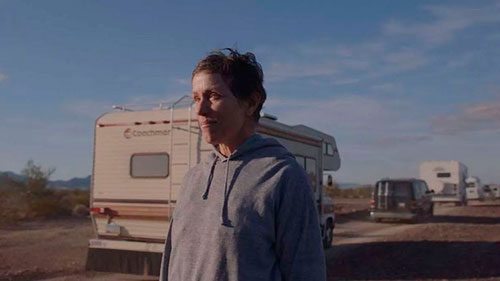
https://www.labiennale.org/en/news/official-awards-77th-venice-film-festival
